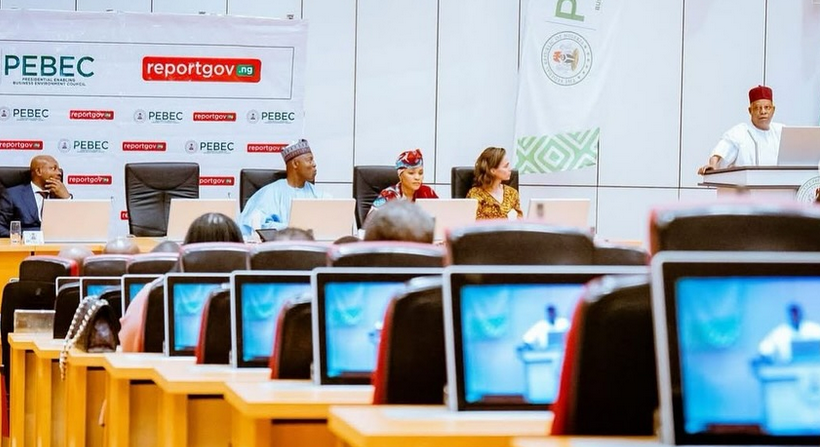The Lagos Business School Public Sector Initiative recently facilitated capacity-building sessions at the two-day interagency collaboration retreat hosted by the Presidential Enabling Business Environment Council (PEBEC).
Held on April 16 and 17, 2025, at the National Intelligence Agency (NIA) HQ, the retreat aimed to deepen interagency collaboration, enforce accountability in service delivery, and accelerate reforms to enhance Nigeria’s business environment, economic growth, and public trust.
This high-level engagement was attended by Heads of Ministries, Departments, and Agencies (MDAs), key stakeholders in government, members of the diplomatic corps, business environment collaborators and Reform Champions.
The retreat featured presentations, keynote speeches, panel discussions, baseline report presentations, and interactive engagements among MDA leaders and stakeholders. The deliberations culminated in resolutions to institutionalise reform mechanisms, enhance feedback, and deepen interagency collaboration.
Key outcomes included:
- Adoption of a unified Service Charter framework with measurable standards.
- Commitment to automation, e-governance integration, and quarterly performance reviews.
- Re-commitment of Reform Champions in MDAs to drive accountability.
- Resolutions to address critical gaps in service delivery, including poor responsiveness, delayed timelines, and corruption.
Speaking at the retreat, the Dean of Lagos Business School, Professor Olayinka David-West, highlighted the motivational and cultural dimensions of successful reforms. She stressed that beyond structural changes and regulatory amendments, there is a pressing need to ignite a sense of shared responsibility and intrinsic motivation among public servants.
The Dean also pointed out that reform is not about the success of one agency or the accolades earned by a few individuals but the building of a unified, responsive system that serves the broader interests of one Nigeria. She stressed that transformational change is a collective endeavour that requires agencies to act not in isolation, but in concert with one another, driven by a shared vision and sustained by mutual accountability.
Dr Franklin Ngwu, Director of the Lagos Business School Public Sector Initiative, also delivered a keynote at the retreat. Drawing on his vast experience and research, Dr. Ngwu introduced a structured roadmap for effective collaboration. He also presented several relevant case studies from the Nigerian public sector, showcasing how collaboration has led to significant, positive results in practice.
Dr. Ngwu identified several sectors where interagency collaboration is particularly crucial, including disaster management, national security, public health, and environmental protection. He noted that these areas are too complex and interconnected to be effectively handled by isolated agencies working independently of one another. He also candidly acknowledged the common challenges that hinder collaboration, including communication gaps between agencies, confusion over roles and responsibilities, resource constraints, conflicting organisational goals, and a pervasive lack of trust among stakeholders.
He went on to share his recommendations for addressing these challenges, including establishing clear communication channels, defining roles and responsibilities from the outset, and developing a shared vision that all collaborating agencies can collectively embrace.
Inaugurated in July 2016 by the Federal Government, PEBEC is charged with eliminating bureaucratic constraints and improving the overall ease of doing business in Nigeria. It is chaired by the Vice President, with its council comprising ministers, heads of regulatory agencies, and key public sector stakeholders.
Since inception, PEBEC has driven several reform efforts including the enactment of the Business Facilitation Act (BFA), the implementation of the National Action Plan, the adoption of Regulatory Impact Assessment (RIA), and the launch of the ReportGov.ng platform, enabling citizens to provide real-time feedback on government service delivery.
The interagency collaboration retreat is part of PEBEC’s ongoing strategy to ensure sustained momentum in reform implementation and service delivery excellence through coordinated efforts across all levels of government.



